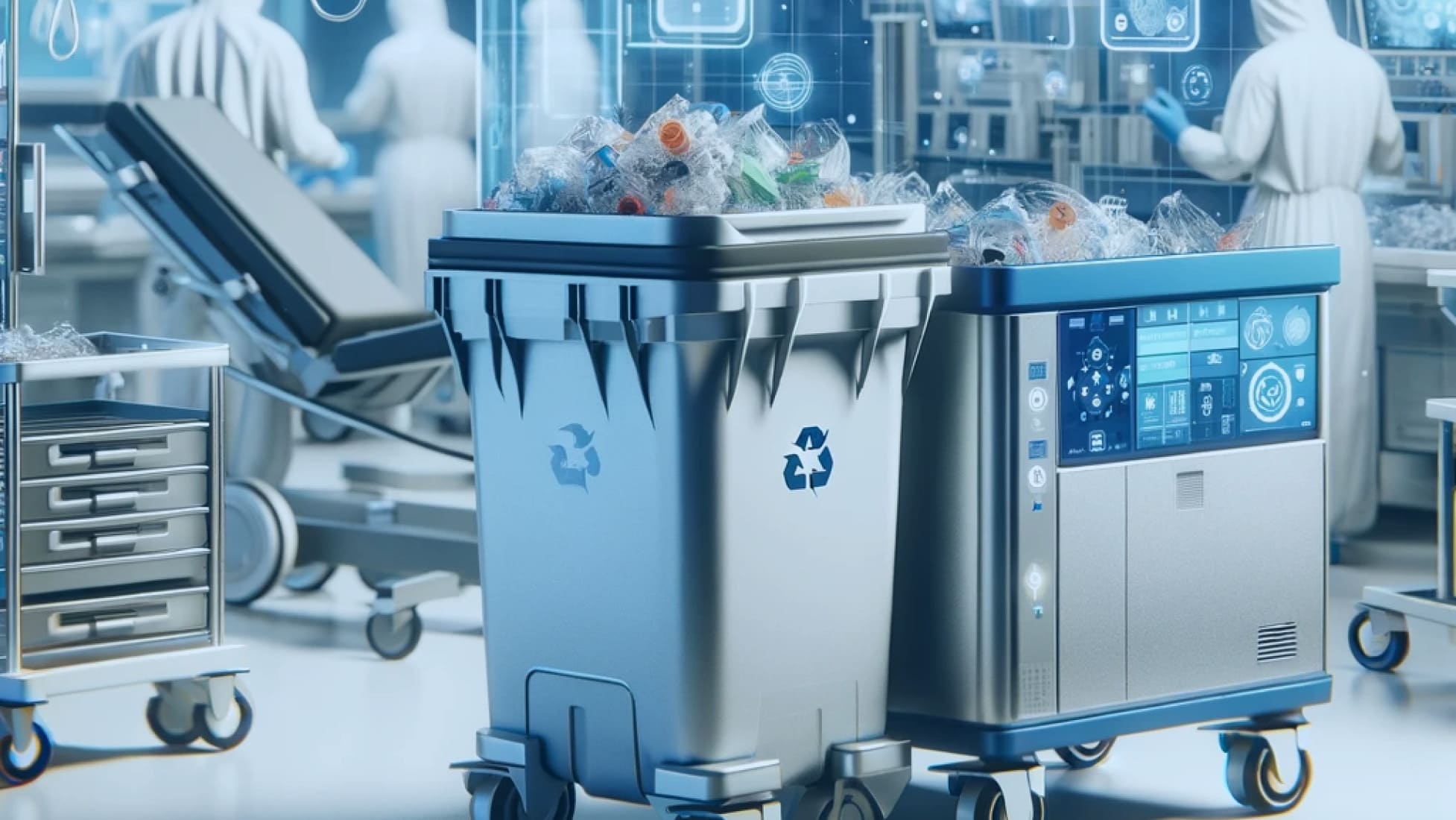Biomedical waste, a byproduct of healthcare activities, poses significant environmental and health risks if not managed properly. In today’s world, where the volume of medical waste is escalating, investing in biomedical waste management services has become not just a necessity but a responsibility. These services not only ensure the safe and efficient disposal of hazardous waste but also align with contemporary approaches like advanced waste collection software. This integration of technology streamlines waste management, making it more effective and compliant with legal standards.
In this comprehensive guide, we explore the top 10 reasons to invest in biomedical waste management services. From safeguarding public health to adhering to legal requirements, these reasons underscore the critical role these services play in our healthcare system.
What is Biomedical Waste?
Biomedical waste, often a topic of concern in healthcare settings, comprises materials that have been contaminated with body fluids, blood, and other potentially infectious materials. Originating from places like hospitals, clinics, dental practices, laboratories, and research facilities, this type of waste requires specialized handling and disposal methods to prevent environmental contamination and the spread of diseases.
There are several types of biomedical waste, each requiring different disposal methods. These include sharps like needles and scalpels, infectious waste like used bandages, pathological waste including human tissues, pharmaceutical waste such as expired drugs, and chemical waste from laboratory operations. Understanding the diversity and potential hazards of these waste types is crucial for effective management.
Effective biomedical waste management is more than just disposing of waste. It’s about understanding its nature and implementing systematic, safe, and regulatory-compliant methods to handle it. This knowledge is foundational to exploring the reasons why investing in biomedical waste management services is not just beneficial but essential for healthcare facilities.
The Growing Need for Effective Biomedical Waste Management
The global healthcare industry has witnessed exponential growth, leading to an unprecedented increase in biomedical waste. This surge is fueled by factors like the expansion of healthcare facilities, the rise in chronic diseases, and the growing use of disposable medical products. The COVID-19 pandemic further escalated the volume of medical waste, underscoring the urgent need for robust waste management systems.
Improper disposal of biomedical waste poses serious threats. It can lead to environmental pollution, harming wildlife and ecosystems. The risk of infection spread is high, with the potential of causing diseases such as hepatitis and HIV. Moreover, inadequate waste management can result in the contamination of soil and water sources, posing long-term public health risks.
The escalating volume and complexity of biomedical waste make it imperative for healthcare facilities to adopt advanced management strategies. This is where biomedical waste management services, equipped with innovative technologies and expertise, become indispensable. They ensure that waste is handled, treated, and disposed of in a manner that minimizes environmental impact and health risks, aligning with both ethical and legal standards.
we will explore the first of our ten reasons to invest in these services, focusing on environmental protection.
Reason 1: Environmental Protection
Investing in biomedical waste management services is crucial for safeguarding our environment. Improper disposal of medical waste can lead to severe environmental consequences, including soil and water pollution. When biomedical waste is not correctly treated and disposed of, harmful substances can leach into the ground, contaminating water sources and harming aquatic life. This contamination can disrupt ecosystems and lead to the bioaccumulation of hazardous substances in the food chain.
Additionally, the incineration of medical waste, if not carried out correctly, can release toxic gases and particulates into the atmosphere. These emissions contribute to air pollution and can pose health risks to nearby communities. Professional waste management services use advanced technologies and methods, such as autoclaving and chemical treatment, to minimize the environmental impact of waste disposal.
By investing in these services, healthcare facilities can significantly reduce their ecological footprint. It demonstrates a commitment to environmental stewardship and ensures that waste disposal practices align with sustainable development goals. This is not just an ethical decision but a strategic move towards a greener and more sustainable future.
Reason 2: Public Health Safety
One of the most compelling reasons to invest in biomedical waste management services is the protection of public health. Improper handling and disposal of biomedical waste can lead to the spread of infectious diseases, posing a significant health risk to healthcare workers, waste handlers, patients, and the general public.
When biomedical waste, such as sharps, contaminated materials, or infectious substances, is not disposed of correctly, it can lead to accidental injuries or exposure to infections. Diseases like hepatitis, HIV, and other blood-borne infections can spread through mishandling of medical waste. This risk is particularly acute in areas where waste is not segregated or treated properly.
Biomedical waste management services employ strict protocols and advanced technologies to ensure the safe handling, transportation, and disposal of medical waste. They train personnel in proper waste handling procedures, reducing the risk of accidental exposure and ensuring a safer environment for everyone.
By investing in these services, healthcare facilities can significantly mitigate the risk of disease transmission associated with medical waste. It reinforces the commitment to patient and staff safety, showcasing a responsible approach to healthcare management.
Reason 3: Legal Compliance and Reduced Liability
Investing in professional biomedical waste management services is not only a matter of environmental and public health responsibility but also a legal necessity. Most countries have stringent regulations governing the handling, treatment, and disposal of biomedical waste. These regulations are designed to minimize the environmental and health impacts of waste, and failure to comply can result in severe penalties, legal actions, and reputational damage.
By outsourcing waste management to these services, healthcare facilities can significantly reduce their liability. In the event of an audit or inspection, having a professional service in charge of waste management demonstrates due diligence and a commitment to regulatory compliance. This not only protects the facility from legal repercussions but also enhances its reputation as a responsible healthcare provider.
Reason 4: Cost-Effectiveness of Professional Services
Investing in biomedical waste management services may seem like an additional expense for healthcare facilities, but it is, in fact, a cost-effective choice in the long run. Handling waste in-house requires significant resources, including specialized equipment, trained personnel, and adherence to complex regulatory frameworks. By outsourcing this function, facilities can avoid these direct and indirect costs.
Reduction in Capital Expenditure:
Professional services eliminate the need for healthcare facilities to invest in expensive waste treatment and disposal equipment. This can lead to significant savings in capital expenditure.
Operational Efficiency:
Outsourcing waste management allows healthcare staff to focus on their core responsibilities, enhancing operational efficiency. This streamlined approach can lead to overall cost savings, as it optimizes staff time and resources.
Risk Mitigation:
Professional waste management services are experts in navigating the legal landscape of waste disposal. By ensuring compliance, they mitigate the risk of costly legal penalties and reputational damage that can arise from non-compliance.
Scalability and Flexibility:
Biomedical waste management services offer scalable solutions that can be tailored to the specific needs of different healthcare facilities. This flexibility allows for cost-effective waste management solutions that are aligned with the size and scope of the facility.
Advanced Waste Management Practices:
These services often utilize advanced technologies and practices, such as advanced waste collection software, which can further optimize the waste management process and reduce costs.
By understanding these economic benefits, healthcare facilities can see the value in allocating resources to professional biomedical waste management services.
Reason 5: Advanced Waste Collection Software
The integration of advanced waste collection software represents a significant leap forward in biomedical waste management. This technology plays a pivotal role in enhancing the efficiency, accuracy, and safety of waste handling processes. Investing in services that utilize such software offers numerous benefits:
Real-Time Tracking and Monitoring:
Advanced software enables real-time tracking of waste from its point of origin to final disposal. This level of monitoring ensures transparency and accountability in the waste management process.
Improved Compliance Management:
The software often includes features that assist in compliance management, such as generating necessary documentation and ensuring adherence to regulatory guidelines. This reduces the risk of non-compliance and associated penalties.
Enhanced Operational Efficiency:
By automating many aspects of waste management, from scheduling pickups to optimizing routes, this software significantly enhances operational efficiency. It reduces manual effort and potential errors, leading to a more streamlined process.
Data Analysis and Reporting:
Advanced software provides valuable data analytics and reporting capabilities. This allows healthcare facilities to assess their waste management practices, identify areas for improvement, and make data-driven decisions.
Customization and Scalability:
The software can be customized to meet the specific needs of different healthcare facilities, making it a scalable solution that grows with the organization.
The use of advanced waste collection software in biomedical waste management services offers a modern, efficient, and compliant approach to handling medical waste, proving to be an invaluable asset for healthcare facilities.
Reason 6: Enhanced Efficiency in Waste Handling
Efficiency is paramount in healthcare operations, and this extends to waste management. Professional services swiftly and effectively manage waste by streamlining the entire handling process, from segregation to disposal. This efficiency not only saves time but also ensures that healthcare facilities can focus on patient care without the added burden of waste management concerns.
Reason 7: Staff Safety and Health
Investing in biomedical waste management services significantly contributes to the safety and health of the staff. These services follow strict safety protocols and use appropriate gear and equipment to handle hazardous waste, thereby reducing the risk of injuries or infections among healthcare workers and waste management personnel.
Reason 8: Upholding Community Reputation
A healthcare facility’s approach to waste management reflects on its overall reputation in the community. By prioritizing safe and responsible waste disposal practices, facilities demonstrate their commitment to public health and environmental sustainability, enhancing their standing and trust within the community.
Reason 9: Leveraging Technological Advancements
New technologies and methods are continually evolving the field of biomedical waste management, enhancing safety and efficiency. By partnering with professional waste management services, healthcare facilities can leverage these technological advancements, staying at the forefront of modern waste management practices.
Reason 10: Adherence to Global Standards
As healthcare becomes more globalized, adherence to international waste management standards becomes essential. Professional biomedical waste management services ensure that healthcare facilities meet these global standards, paving the way for international collaborations and recognition.
Conclusion
The investment in biomedical waste management services is a strategic and responsible decision for any healthcare facility.
The reasons to invest in biomedical waste management are varied and compelling. It ranges from environmental protection to legal compliance and technological advancements. Partnering with professional services boosts efficiency, safety, and community welfare.
In today’s healthcare landscape, intertwined with technology, advanced waste management, especially using innovative software, is crucial. Investing in professional services is essential for a sustainable, safe healthcare future.



